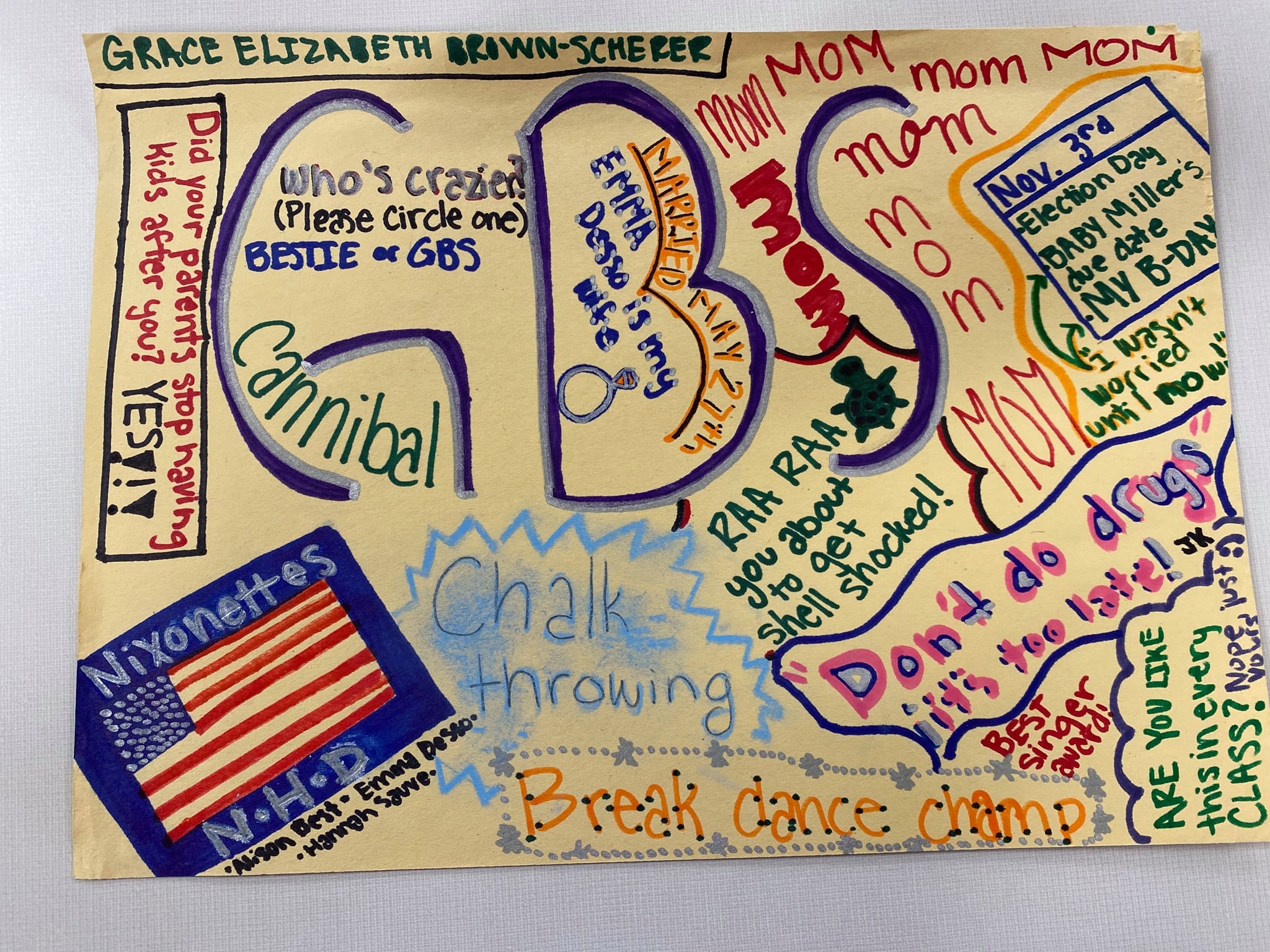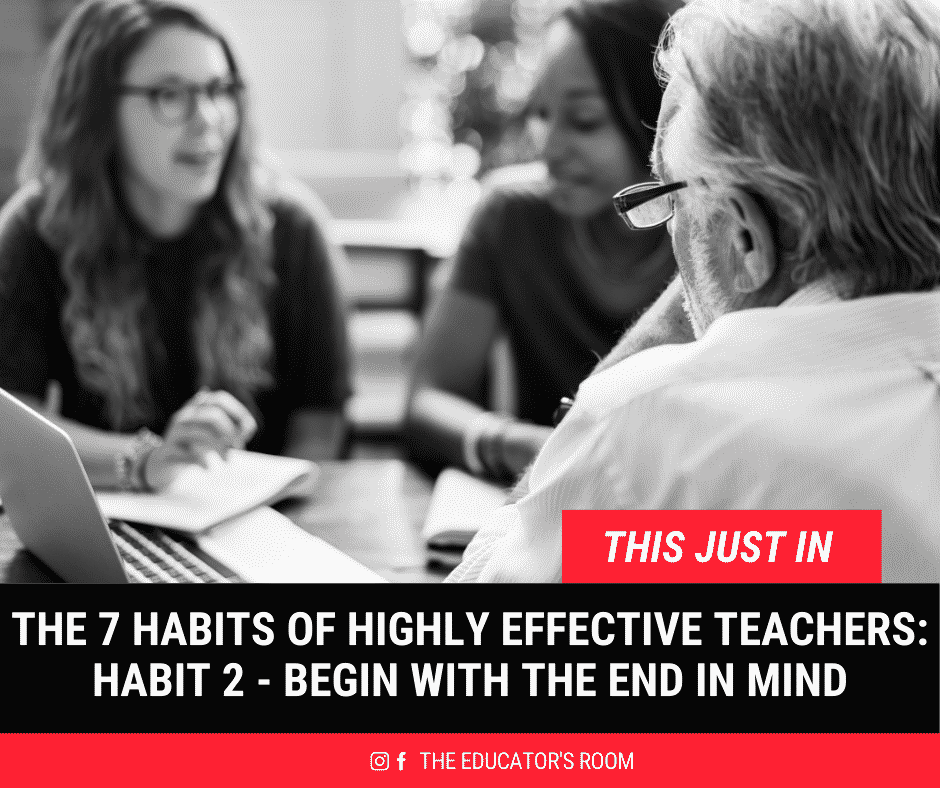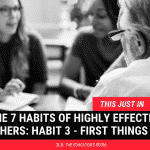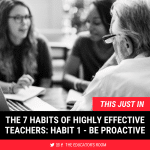When I studied for my M.Ed. in Leadership, the lasting lesson that I pulled from my coursework was from a program called Understanding By Design (now called “Backward Design”). It essentially advocates effective teaching is to lesson plan by beginning with the outcome – whether for the year, unit, week, or lesson. Why?
The most finite resource for us as teachers is time. American teachers have only 180 school days to make an impact with our students, and by the time we’re finished teaching them, they move on to the next cadre of teachers who have their own curriculum and principles to portray. So what do you want to do with that time?
Last week we talked bout being proactive. This week, we move onto our next topic. To do that, we are going to explore Stephen Covey’s epic 7 Habits of Highly Effective People these next few months, which are:
- Be Proactive (click here to read)
- Begin with the End in Mind
- First Things First
- Think Win-Win
- Seek to Understand, then Seek to Be Understood
- Synergy
- Sharpen the Saw
2nd Habit: Begin with the End in Mind
Part I. Start with the Last Day of School
When the calendar courses its way through summer, it is difficult to find a teacher who is not excited about the first day of school. They are pondering so many things about what to try different this year, and how this first day will be odds on better than any other. And this will UNDOUBTEDLY be the first year that we teach the entire curriculum — in full.
This type of crafting continues for several weeks, often until we limp into the conference season at or around Thanksgiving. Then the Survival Button is often all we see for weeks, months, or the remainder of the year. From there, that excitement is still present, but not as omnipresent as it was in our July dreams.
And the entire curriculum? Puh-lease. We’re going to have to cut at least 2 of the units!
The most effective way I’ve found to hold onto that summer hope is to not start with an incredible first day of school, but the last day. My colleagues and I have created a spreadsheet showing when we should teach what unit and for how long. It drives our decisions not just on day 1, but on day 100 when the kids wear their Old Fogie clothes.
[bctt tweet=”The most effective way I’ve found to hold onto that summer hope is to not start with an incredible first day of school, but the last day. #BackwardDesign #BeginWithEndInMind #7HabitsEffectiveTeachers” username=”MrJakeMiller”]
And I relish the last day of school. They hand in their “Final Processing Assignment,” which has woven in words and pictures of how I’ll remember them (check out the photo below). I also amuse them with tales of our school year from my journal, shake every kid’s hand and wish them well, and ask them to stay in touch.

Because I begin with the end in mind, many will.
Part II. Develop a Mission Statement
I’ve been part of several constitution and bylaws committees, and I’ve come to truly respect and latch onto the mission statements of organizations. As an environmentalist, one of my favorite mission statements is from the brand Patagonia, and it is:
Build the best product, cause no unncessary harm, use business to inspire and implement solutions to the environmental crisis.
When Patagonia decided to close on Black Friday and pay their workers to participate in “Hiking Friday,” many were surprised. I wasn’t. And when they became one of the first companies to be carbon negative, I looked at how it met their mission statement.
Kids remember my classroom because I have hundreds of quotes on the walls, so I saw it only fitting to make my annual mission statement from a quote – a new one for each year. It hangs above the doorway in my room. This year’s is
The difference between obstacles and stepping stones is how high one raises their foot. This year – more than ever – step up.
I also have a personal mission statement. My family has a mission statement. And none of these are cast in stone. When we make big decisions, we revisit the mission statement and see what needs to change – the mission or the decision.
Part III. Focus on Character over Content
When people ask one of my best friends at school what he teaches, he’ll often say “kids.” I used to laugh about it when he would say this, thinking he was just being sarcastic with his tone.
But one day he stopped me and said, “I’m not joking when I say this, I teach kids. What do you teach?”
I said, “Eighth-grade history class, 1860 through 1929.”
“You see,” he said, “that’s your problem. I don’t teach 6th-grade geography. I teach the kids. They’re really all that matters.” He continued. “Sometimes I have to not teach 6th-grade geography to teach the kids.”
Ever since that day, I’ve been focusing on character over content. The news isn’t part of my curriculum, but I’m trying to make informed citizens, so each and every day we begin with 4 news stories. I have mock trials, rap battles, and play games with the students. They’re learning, yes, but they’re also building community and becoming better people.
In the end, when your career is said and done, former students – now grown and in their 40s, many with kids themselves – aren’t going to thank you for teaching them about the Civil War, 5-paragraph writing, water tables, or times tables. They’re going to thank you for teaching them.
[bctt tweet=”When your career is over, former #students aren’t going to thank #teachers for teaching them water tables or times tables. They’re going to thank you for teaching THEM. #7HabitsEffectiveTeachers” username=”MrJakeMiller”]
Part IV. Who’s Speaking at Your Funeral?
Probably the most jarring part of Stephen Covey’s book is the part of this chapter. In fact, the chapter begins with the question – “who are the 3 people speaking at your funeral?“
Talk about beginning with the absolute end in mind!
But it’s an important question. We say we are “family first” – but do our actions meet our words? What exactly will our son(s) or daughter(s) say at our funeral – we went into school every Saturday to lesson plan? We were late for dinner because we were doing the jobs of 2 people, and the district to advantage of us?
When it’s time for me to turn in life’s keys, here is who I hope speaks at my funeral; this is what I hope they’ll say:
- A former student – “He valued his connection with all his students. He pushed us. He was fair. He learned from us. He cared not just what he taught us or when he taught us, but how he impacted us.”
- A colleague – “He was someone I could talk to and trust. He made me better, and I made him better. He knew when to fight, and when to go along. He made the profession better inside the classroom and out.”
- A son – “My dad ceaselessly taught many people many lessons. He taught people to be better. He traveled the world to learn, to share his message and his lessons, and to model what it meant to learn for a lifetime. But, most importantly, we knew his most important classroom was the one he and my mom established at home.








Beautifully said — the section about 3 people at your funeral really hit home. It reminded me of a dear colleague who unexpectedly passed a few years ago. Her service was standing room only with current and former students – each with their own Mrs. O. story to share after the service. My boss just asked me what I hope my students will learn when they graduate on to high school meaning the take aways – not the curriculum. Thank you for this reminder.